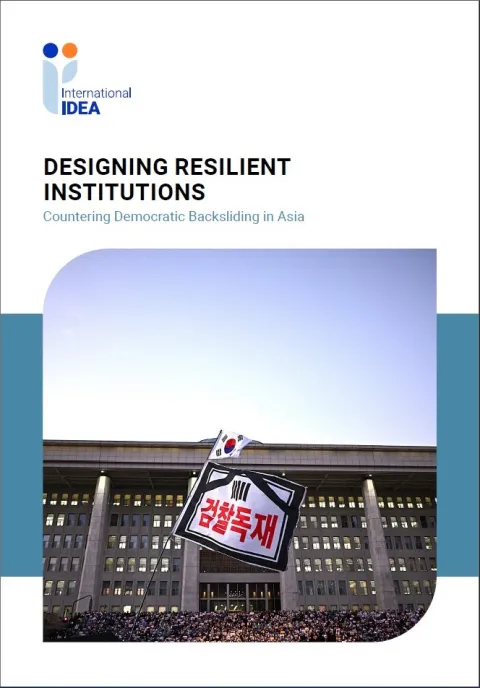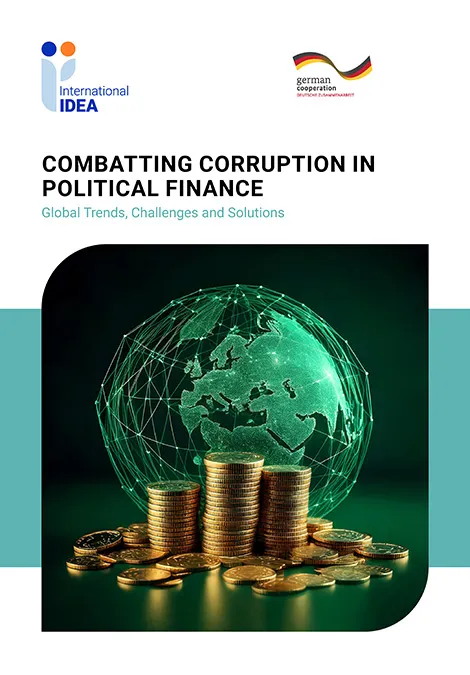The key findings on inclusion in relation to gender and social group equality derived from the most recent update to the Global State of Democracy (GSoD) Indices data are as follows.
Search
Region
Country
Type
El pasado 16 de noviembre se reunieron en la Ciudad de México Miguel Angel Lara Otaola –jefe de la Oficina Subregional para México y Centroamérica—y Yuri Beltrán Miranda—consejero electoral del Instituto Electoral de la Ciudad de México (IECM)–. En el encuentro se exploraron posibilidades de colaboración entre ambas instituciones y de acompañamiento a los procesos electorales y de participación ciudadana en la Ciudad de México.
Miguel Angel Lara Otaola, International IDEA’s Head of Programme for the Mexico and Central America Office, and Yuri Beltrán Miranda, Councillor of Mexico City’s Electoral Institute (IECM, for its acronym in Spanish), met in Mexico City to explore potential collaboration between both institutions and the potential support from International IDEA to Mexico City’s election and citizen participation processes.
The Intergovernmental Authority on Development (IGAD) and the International Institute for Democracy and Electoral Assistance (International IDEA) on November 17 signed a Memorandum of Understanding (MoU) for the promotion of good governance, democracy, peace and security in the IGAD Region. The MoU was signed by the Executive Secretary of IGAD, H.E (Amb) Mahboub Maalim and International IDEA’s Africa and West Asia Regional Director, Prof Adebayo Olukoshi.
Disclaimer: Views expressed in this commentary are those of the staff member. This commentary is independent of specific national or political interests. Views expressed do not necessarily represent the institutional position of International IDEA, its Board of Advisers or its Council of Member States.
Œuvrant pour une consolidation des systèmes de partis politiques structurés autour d’idéologies cohérentes qui agrège les besoins et demandes des citoyens-es, l’Institut international pour la démocratie et l’assistance électorale (IDEA International) a réalisé en 2016, dans le cadre de son projet Support à la consolidation démocratique en Haïti, une série d’entretiens diffusés dans l'émission Ann Pale Politik afin de mieux cerner les dynamiques idéologiques qui traversent le paysage
Declaración: Las opiniones expresadas en este comentario son las del miembro del personal. Este comentario es independiente de intereses nacionales o políticos específicos. Las opiniones expresadas no representan necesariamente la posición institucional de International IDEA, su Consejo de Asesores o su Consejo de los Estados Miembros.
Constitution-building processes are increasingly seen as critical elements within both peacebuilding and state-building processes.
Fiji’s 2018 parliamentary elections took place on 14 November with over 630,000 registered voters at 2,173 polling stations, including advanced and postal voters. With heavy rain and a tropical disturbance throughout the voting day, the Fijian Elections Office (FEO) postponed voting in 25 polling stations to 17 November. This year’s turnout is expected to be lower compared to the 2014 elections.
Mongolia’s political finance regulatory framework faces significant challenges. Lack of enforcement, influence of private business interests and various loopholes have eroded people’s confidence in politics and posed obstacles for women and youth to access positions of power and decision making at all levels.
The Federal Competitiveness and Statistics Authority of United Arab Emirates hosted the second UN World Data Forum in Dubai on 22-24 October 2018. The Forum brought together a wide array of actors from national statistics offices, government institutions, international and intergovernmental organizations, the private sector, civil society, academia and media.
Yangon is at a critical juncture on its path towards democracy as its administrative body, the Yangon City Development Committee (YCDC), is preparing for the first ever fully democratic municipal elections in Myanmar early next year.
International IDEA co-hosted the Third Annual Melbourne Forum (MF3) on “Implications of Culture for Constitution Building” on 15-16 October 2018 in Colombo, Sri Lanka. The Melbourne Forum on Constitution-Building is organized jointly with the Constitution Transformation Network at Melbourne Law School.
By-elections are of great importance to a representative and credible democracy as seats need to be filled to ensure the legitimacy and function of Myanmar’s various parliaments. On 3 November 2018, Myanmar held by-elections to fill the 12 vacant seats of three houses and levels (Upper House, Lower House, and State and Region Parliaments), plus the vacant position of the Shan Ethnic Affairs Representative in Mandalay.
Relations between the media and electoral authorities can be strained or uneasy, and the result of such strained relations can be misinformation or missed opportunities. Since public confidence (and ultimately acceptance of the electoral results) is at stake, there can be no doubt of the importance for electoral management bodies (EMBs) to building solid working relations with the media to ensure that the electorate is well-informed about the electoral processes and developments.
Disclaimer: Views expressed in this commentary are those of the staff member. This commentary is independent of specific national or political interests. Views expressed do not necessarily represent the institutional position of International IDEA, its Board of Advisers or its Council of Member States.
Ensuring the effective implementation of political finance regulations and regularly updating them to appropriately address new risk areas are the keys to successful anti-corruption efforts. In order to influence the global policy debate on money in politics, International IDEA has recently participated in two major international anti-corruption events; the 18th International Anti-Corruption Conference (IACC) and the 18th EPAC/EACN Annual Professional Conference.
Electoral management bodies (EMBs) in Africa generally have broad constitutional mandates to oversee electoral processes and the management of elections.
However, in many cases, the establishment of EMBs has not been matched by sufficient or timely commitment of resources needed for the fulfilment of their mandates. The topic of financing elections has therefore become a pressing issue among African election practitioners.
Disclaimer: Views expressed in this commentary are those of the staff member. This commentary is independent of specific national or political interests. Views expressed do not necessarily represent the institutional position of International IDEA, its Board of Advisers or its Council of Member States.
Mongolian People’s Party, Democratic Party, Mongolian People’s Revolutionary Party, Civil Will Party and National Labour Party recently all came together at a training event to face common challenges: integrity and inclusivity in political party finance. The event allowed unprecedented dialogue on these issues to emerge.


